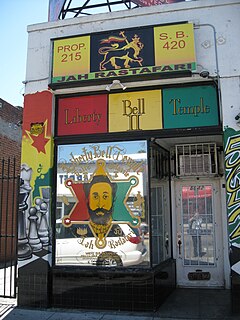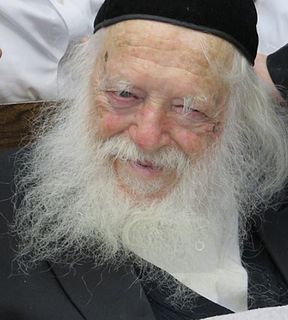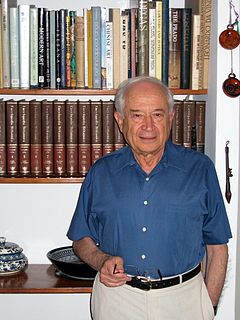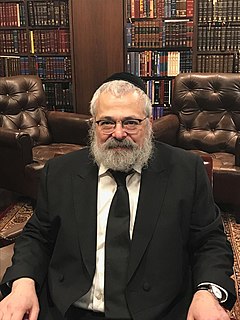Related Research Articles
Kashrut is a set of dietary laws dealing with the foods that Jews are permitted to eat and how those foods must be prepared according to Jewish law. Food that may be consumed is deemed kosher, from the Ashkenazi pronunciation of the Hebrew term kashér, meaning "fit".
Kitniyot is a Hebrew word meaning legumes. During the Passover holiday, however, the word kitniyot takes on a broader meaning to include grains and seeds such as rice, corn, sunflower seeds, and sesame seeds, in addition to legumes.

Kosher wine is grape wine produced according to Judaism's religious law, specifically, Jewish dietary laws (kashrut).

In Judaism, shechita is slaughtering of certain mammals and birds for food according to kashrut.

Kosher foods are those that conform to the Jewish dietary regulations of kashrut, primarily derived from Leviticus 11 and Deuteronomy 14:1-21. Food that may be consumed according to halakha (law) is termed kosher in English, from the Ashkenazi pronunciation of the Hebrew term kashér, meaning "fit". Food that is not in accordance with law is called treif meaning "torn."

Different religions have varying stances on the use of cannabis, historically and presently. In ancient history some religions used cannabis as an entheogen, particularly in the Indian subcontinent where the tradition continues on a more limited basis.

Shmaryahu Yosef Chaim Kanievsky is an Israeli Haredi rabbi and posek. He is considered a leading authority in Haredi Jewish society.

OK Kosher Certification is one of the major kosher certification agencies.

Moshe Feinstein or Moses Feinstein was an American Orthodox rabbi, scholar, and posek. He has been called the most famous Orthodox Jewish legal authority of the twentieth century and his rulings are often referenced in contemporary rabbinic literature. Feinstein served as president of the Union of Orthodox Rabbis, Chairman of the Council of the Moetzes Gedolei HaTorah of the Agudath Israel of America, and head of Mesivtha Tifereth Jerusalem in New York.

Chaim Yisroel Belsky was an American rabbi and posek of Orthodox Judaism and Haredi Judaism who resided in Brooklyn, New York. He was one of the roshei yeshiva at Yeshiva Torah Vodaas, and rabbi of the summer camp network run by Agudath Israel of America.

Rabbi Dov Lior is an Israeli Orthodox rabbi, who served as the Chief Rabbi of Hebron and Kiryat Arba in the southern West Bank until late 2014. He is also the rosh yeshiva of the Kiryat Arba Hesder Yeshiva, and also heads the "Council of Rabbis of Judea and Samaria".

David Hanoch Yitzchak Bar-Hayim is an Israeli Orthodox rabbi who heads the Shilo Institute, a Jerusalem-based rabbinical court and institute of Jewish education dedicated to the Torah of Israel.

Cannabis consumption refers to the variety of ways cannabis is consumed, among which inhalation and ingestion are most common. All consumption methods involve heating the plant's THCA to decarboxylate it into THC, either at the time of consumption or during preparation. Salves and absorption through the skin (transdermal) are increasingly common in medical uses, both of CBD, THC, and other cannabinoids. Each method leads to subtly different psychoactive effects due to the THC and other chemicals being activated, and then consumed through different administration routes. It is generally considered that smoking, which includes combustion toxins, comes on quickly but lasts for a short period of time, while eating delays the onset of effect but the duration of effect is typically longer. In a 2007 ScienceDaily report of research conducted at the University of California–San Francisco, researchers reported that vaporizer users experience the same biological effect, but without the toxins associated with smoking. Δ9-THC is the primary component when inhaled, but when eaten the liver converts this to the more psychoactive 11-hydroxy-THC form.
Tza'ar ba'alei chayim, literally "suffering of living creatures", is a Jewish commandment which bans causing animals unnecessary suffering. This concept is not clearly enunciated in the written Torah, but was accepted by the Talmud as being a biblical mandate. It is linked in the Talmud from the biblical law requiring people to assist in unloading burdens from animals.

The KosherSwitch is a wall switch marketed to the observant Jewish market and institutions servicing this market, as a means of controlling electricity on-demand on Shabbat and Jewish holidays in a manner that is permissible according to some Orthodox authorities, though many reject it. It is manufactured by KosherSwitch Technologies headquartered in New York City and was invented by Andy Menashe Kalati.

Cannabis in Israel is allowed for specified medical usage, and is illegal but partially decriminalized for recreational use, with prosecution for home use and possession of 15 grams or less generally not enforced by the authorities. Public and cross-party political support for the complete decriminalization of cannabis increased in the 2010s with increasing usage for both medical and recreational purposes, and the establishment of a political party primarily devoted to this cause; on July 19, 2018, the Knesset approved a bill for decriminalization, although the supporters of recreational cannabis use insisted that this did not represent complete decriminalization. The law came into effect on April 1, 2019. On June 25, 2020, further legislation designed to decriminalize possession of up to 50 grams of cannabis began its passage through the Knesset.
In Judaism, there is debate that cannabis may have been used ritually in ancient Judaism, and the use of cannabis continues to be a controversial topic in modern Judaism.

On October, 17, 2018, cannabis was legalized in Canada for recreational and medical purposes. It was already legal for medicinal purposes, under conditions outlined in the Marihuana for Medical Purposes Regulations issued by Health Canada, and for seed, grain, and fibre production under licence by Health Canada.

Yehoram Ulman is a rabbi in Sydney, Australia. He was born in Leningrad, USSR in 1964. He holds a number of senior positions in the Orthodox Jewish community.
Ethiopian Jewish cuisine is the cuisine of the Beta Israel. The cuisine of the Ethiopian Jews is similar to the cuisine of other Ethiopians, with some variations.
References
- 1 2 "Efraim Zalmanovich Archives — Jewish Journal". Jewishjournal.com. 2013-06-28. Retrieved 2017-04-27.
- ↑ Surkes, Sue (2013-06-28). "Rabbi: Weed is kosher if medicinal". The Times of Israel . Retrieved 2017-04-27.
- 1 2 Malul, Chen (2015-04-01). "Are cannabis and cigarettes kosher for Passover? - Sites". Haaretz.com. Retrieved 2017-04-27.